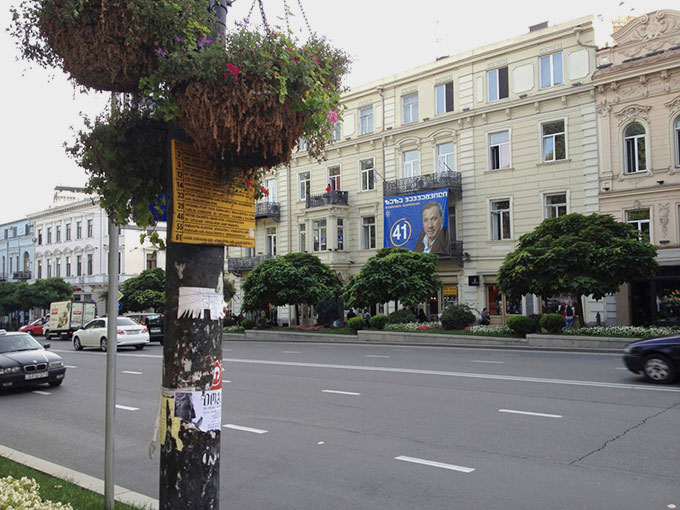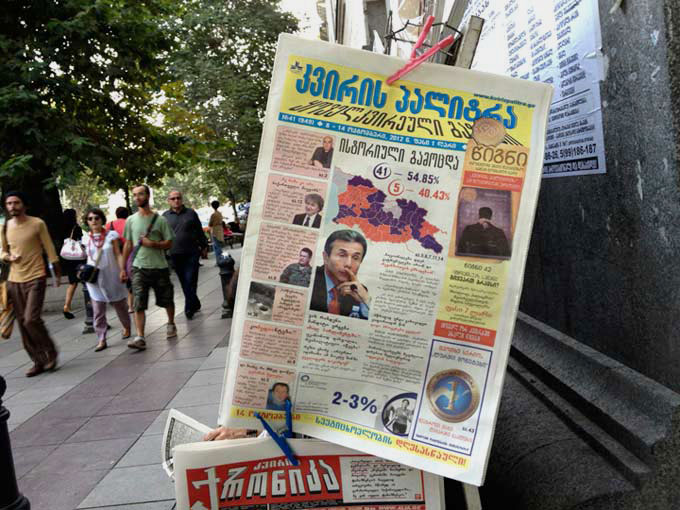
A banner supporting Bidzina Ivanishvili’s Georgian Dream party hangs above Rustaveli Avenue, Tbilisi’s main thoroughfare, 2012. Photo by Aaron Krach.
The emails started arriving weeks ago. Prepare for political unrest, social upheaval and violent demonstrations in the streets of Tbilisi.
I was headed to the capital of Georgia to create a series of socially engaged public projects. Except two days before my arrival, Georgians would go to the polls for parliamentary elections. Their choice: Re-elect President Mikheil Saakashvili’s center-right party, in power for nine years and considered a friend of the U.S., or vote for the opposition Georgian Dream coalition, led by Bidzina Ivanishvili, an unknown candidate promising legal reform and renewed ties with Russia. If only it was that simple: an incumbent vs. a challenger, East vs. West.
Saakashvili holds all the power in Georgia. He is the president and the head of the United National Movement Party (UNM) that holds a majority in parliament. He and his party control the judiciary and state-run television. In some parts of the country, his channel is the only one available. Meanwhile, Ivanishvili is a billionaire art collector who made his fortune in post-Soviet Russia by acquiring state-owned companies and selling them at much higher prices. He had given only one interview to the press before entering politics last April, which he did by personally bankrolling the creation of a new party.
In the weeks leading up to the election, both sides rallied their fans to public demonstrations and street protests. A fair election, not to mention a peaceful transition of power, appeared out of reach.
Enter diplomats filling hotel rooms from around the world to offer advice. Add thousands of election monitors spread across the country. Throw in a dozen international artists working in public spaces—and pass the Aspirin.
“Here we have a little bit of a complicated political situation,” wrote a Georgian curator. “The whole country is shocked and astonished. The Art Academy changed the semester’s starting date and now it will start a week later…because thousands of [students] are in the streets, rebelling and participating in large meetings.”
A day later, I received an email from American curator Lydia Matthews, who was heading to the country to work on the exhibition I was taking part in: “Last week there were videos leaked to the press showing torture in Georgian prisons, which has sparked outrage and protests. Fingers crossed that the dust mostly settles by the time we arrive.”

Election Results in Kviris Palitra newspaper: Georgian Dream party takes 54.85 percent of the vote, 2012. Photo by Aaron Krach.
What took place on October 1 was not at all what I expected, and not what Georgians—or the world watching—imagined either. Ivanishvili’s party won and Saakashvili conceded defeat. On election night, the streets of Tbilisi filled up—not with protests, but with flag-waving citizens and honking cars, as if it were New Year’s Eve.
The emotional response is understandable. This could be the first peaceful democratic transition of power in modern Georgian history. A new cabinet has been announced. News coverage has become more even-handed about who Ivanishvili is and what his party will do, which nobody really knows. The parties that came together to elect Ivanishvili share only one goal: Defeat Saakashvili.
When I first arrived in Tbilisi, I found myself inside the art bubble, a place of jetlag, laptops and anticipation. Luckily, my work is also taking place in Eliava, a massive makeshift public market for car parts, electric tape, pomegranates and a thousand items in between, where I can engage a broader public in conversation. Unless pushed, Georgians don’t talk about the elections. So I ask about it, and the responses are almost all positive. On my first day in the market, I met two elderly women who have seen a lot of political drama in their lives. They voted for different people and talked openly, almost joking about it, and then went right back to work.
The reason for the cheery responses I’ve witnessed is a common one, expressed in different ways: Change is good. Georgians, to the apparent surprise of everyone, are willing to take a chance on a new leader. They don’t know what Ivanishvili’s agenda is, but they know who he is not. He is not Saakashvili, who held power—and according to many, abused it—for too long.
“We are very impatient people,” says a Georgian driver while zipping me down the highway. “We want change now.” I ask him about the lingering threat of protests or violence during the coming months and he says, “Of course.” Then he smiles like a proud new parent: “But we are fine.”

